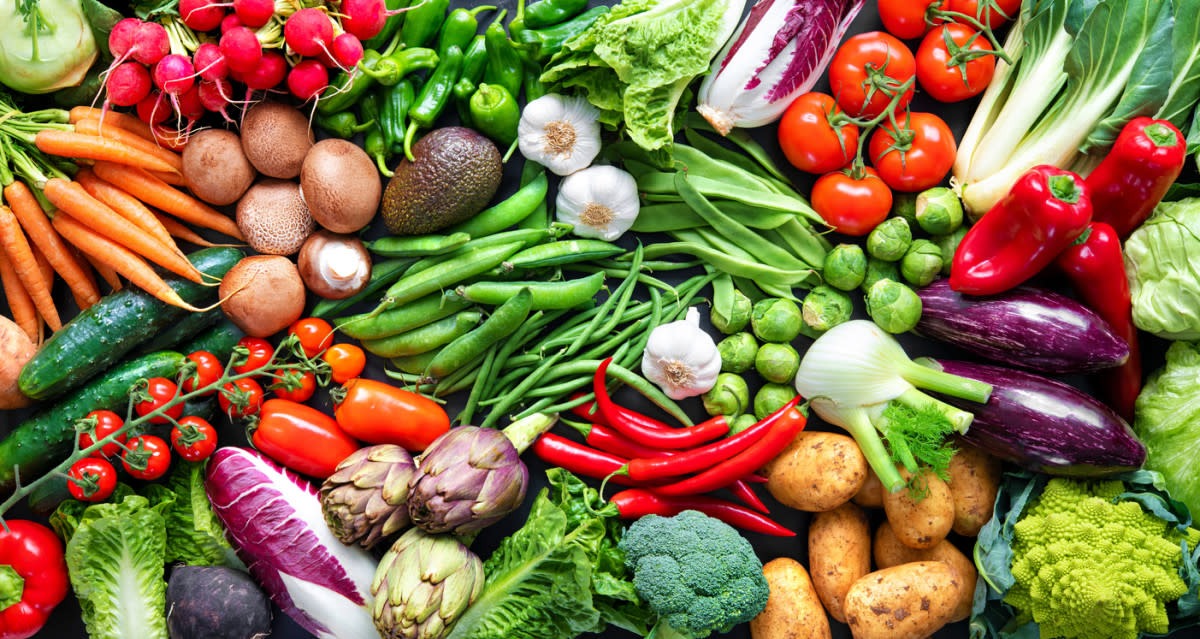‘I'm an Oncologist and This Is the Vegetable I Swear by for Cancer Prevention’

Vegetables
Despite most people knowing that eating vegetables is important, only one in 10 Americans eat the recommended amount. (For the record, adults should eat between two and four cups of vegetables every day.)
Sometimes, it helps to know why you should be eating them regularly. One particularly powerful motivator is that a diet rich in vegetables can significantly help lower the risk of many types of cancer. While all vegetables are healthy and can help lower the risk of cancer, if you aren’t used to eating vegetables regularly, it can be helpful to start by focusing on incorporating one into your meals regularly. With that in mind, keep reading to find out the one oncologists say is most beneficial for cancer prevention.
Why Vegetables—and Fruit—Are So Powerful for Cancer Prevention
What exactly is it about vegetables that make eating them such a powerful way to prevent cancer? Dr. Anaum Maqsood, MD, a specialist in Gastrointestinal Medical Oncology and Hematology Oncology at Houston Methodist, says that one reason is because they’re high in antioxidants, which have cancer-protective qualities.
Scientific studies show that antioxidants play an important role in immune health, including helping to protect against chronic inflammation (which can lead to certain types of cancer and other diseases). All fruits and vegetables are high in antioxidants and foods including beans, legumes, nuts and seeds are too.
Related: 'I'm an Oncologist and This Is the Dinner I Swear By for Cancer Prevention'
“In general, oxidation is a process involved with cancerous growth. Foods such as vegetables that provide antioxidation can be protective. This is why so many vegetables are known to be healthy options for reducing cancer risk,” says Dr. Daniel Landau, MD, an oncologist and hematologist with the Mesothelioma Center at Asbestos.com.
Dr. Donald Barry Boyd, MD, MS, a medical oncologist at Yale Cancer Center, says that another reason why a diet high in vegetables is linked to lowering the risk of cancer is because they’re a good source of fiber. “Dietary fiber is one of the most important components of a high fruit and vegetable diet, along with whole grain breads, and is an important part of my cancer diet recommendations,” he explains, adding that a high-fiber diet is important for gut health. There is a strong connection between gut health and immune health, which is connected to protecting the body from certain types of cancers.
Related: 10 Ways Food Can Help Reduce Your Cancer Risk
An Oncologist’s Favorite Vegetable for Cancer Prevention
It bears repeating that all vegetables have antioxidants and fiber, and can help lower the risk of cancer when eaten regularly. But if you want the most nutritional bang for your buck, you may be wondering what vegetable in particular you should prioritize. Dr. Maqsood says she regularly goes for cruciferous vegetables.
“I like to eat broccoli and zucchini as well as kale, lettuce and spinach in my salads and carrots, cucumbers and celery with a dip for snacks,” she explains.
Dr. Maqsood says that cruciferous vegetables contain phytochemicals that have been shown in several studies to slow the growth of cancers. Besides being such a powerful food for cancer prevention, they’re also super versatile, easy to incorporate into any meal of the day or snack.
Tips for Getting More Veggies Into Your Diet
Dr. Landau says he is often sneaking zucchini and other vegetables into foods to get his kids to eat them. “I often like to hide zucchini in cookies or add carrots when making smoothies,” he says.
Another vegetable Dr. Landau says he eats regularly is sweet potatoes. “They are relatively easy to clean and prepare, and when prepared right, they can be as delicious as traditional French fries are, even when backed or air-fried,” he says. Besides being a good food for cancer prevention, eating sweet potatoes regularly is also good for the heart, eyes and brain.
While Dr. Maqsood and Dr. Landau both personally favor cruciferous veggies (and sweet potatoes, in Dr. Landau’s case), all three doctors emphasize that there isn’t one type of vegetable that’s thought of as the most powerful when it comes to cancer prevention; all vegetables can help decrease your risk. With this in mind, they recommend prioritizing the ones you like the taste of the best. Doing so will make you more likely to actually eat them instead of leaving them to rot in the crisper.
It’s also important to have other healthy habits in place too. “Individuals who consume healthy diets high in organic fruits and vegetables also tend to have healthy lifestyles, including higher levels of physical activity, which itself both reduces cancer risk and improves cancer outcomes,” Dr. Boyd explains. So, while eating your veggies is certainly important, it's also important to exercise regularly, get enough sleep and find effective ways to manage stress.
If you don’t already eat vegetables regularly, consider this your sign to start. Begin by incorporating one vegetable into your meals regularly and then work your way up to introducing more into your diet. Have fun experimenting with new recipes and finding creative ways of incorporating them into your meals, as Dr. Landau does for his kids. You’ll be eating that recommended two to four cups a day before you know it!
Next up, here are seven actions you can take to protect yourself from cancer.
Sources
Dr. Anaum Maqsood, MD, specialist in Gastrointestinal Medical Oncology and Hematology Oncology at Houston Methodist
Dr. Daniel Landau, MD, oncologist and hematologist with the Mesothelioma Center at Asbestos.com
Dr. Donald Barry Boyd, MD, MS, medical oncologist at Yale Cancer Center

